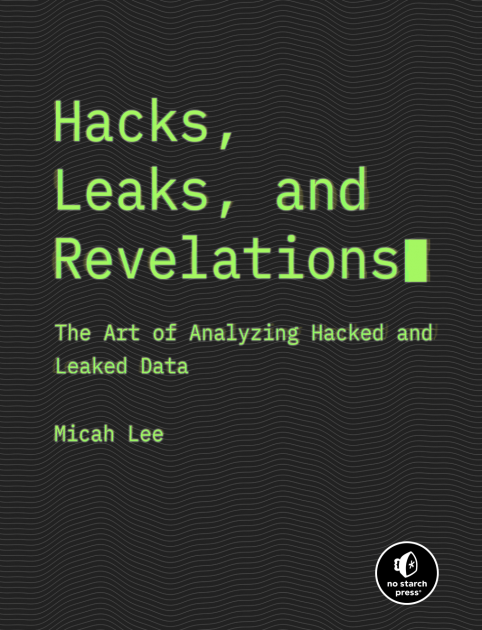Unlock the internet’s treasure trove of public interest data with Hacks, Leaks, and Revelations by Micah Lee, an investigative reporter and security engineer. This hands-on guide blends real-world techniques for researching large datasets with lessons on coding, data authentication, and digital security. All of this is spiced up with gripping stories from the front lines of investigative journalism.
Dive into exposed datasets from a wide array of sources: the FBI, the DHS, police intelligence agencies, extremist groups like the Oath Keepers, and even a Russian ransomware gang. Lee’s own in-depth case studies on disinformation-peddling pandemic profiteers and neo-Nazi chatrooms serve as blueprints for your research.
Gain practical skills in searching massive troves of data for keywords like “antifa” and pinpointing documents with newsworthy revelations. Get a crash course in Python to automate the analysis of millions of files.
You will also learn how to:
- Master encrypted messaging to safely communicate with whistleblowers.
- Secure datasets over encrypted channels using Signal, Tor Browser, OnionShare, and SecureDrop.
- Harvest data from the BlueLeaks collection of internal memos, financial records, and more from over 200 state, local, and federal agencies.
- Probe leaked email archives about offshore detention centers and the Heritage Foundation.
- Analyze metadata from videos of the January 6 attack on the US Capitol, sourced from the Parler social network.
We live in an age where hacking and whistleblowing can unearth secrets that alter history. Hacks, Leaks, and Revelations is your toolkit for uncovering new stories and hidden truths. Crack open your laptop, plug in a hard drive, and get ready to change history.
Reviews
“A fantastic and friendly introduction for journalists, activists, and anyone else.”
—Eva Galperin, Director of Cybersecurity at the Electronic Frontier Foundation
“In this book, Micah masterfully breaks down how to handle a data leak and provides the reader with hands-on examples to hone their skills. If only I had this book when I broke the news of the Epik data breach!”
—Steven Monacelli, Special Investigative Correspondent at the Texas Observer
“Micah Lee . . . has downloaded his wisdom into this highly readable and vitally important guide.”
—Julia Angwin, investigative journalist at The New York Times
“[A] lively and readable how-to guide for arming journalists and researchers.”
—Gabriella Coleman, Harvard Professor, Founder of Hack_Curio, and Tor Project board member
“As a journalist who has been working with data breaches for close to ten years, actually getting to grips with that data is often the hardest part of any reporting project. Lee’s clear and concise book will be an invaluable resource for reporters or researchers just dipping into this sort of data, or those looking for new techniques. I will certainly be using some of the tools myself. Hacked and dumped datasets are rich sources of information that are in the public interest, and Lee’s book will only increase the number of important stories others are able to extract from them.”
—Joseph Cox, Senior Staff Writer at Motherboard/Vice Media
“Micah Lee’s Hacks, Leaks, and Revelations seamlessly blends real-world stories of whistleblowers and data dumps with a top to bottom guide on how to approach those very scenarios yourself. From protecting sources to accessing leaked data, no page is wasted. A must-read for any researcher or journalist regardless of experience.”
—Mikael Thalen, tech and security reporter at The Daily Dot
“The world is awash in hacked and leaked data, and any investigator or journalist hoping to handle it safely and find the newsworthy threads needs to buy this book. Micah’s step-by-step approach to the ethics, safety and tooling is both approachable for the average person with even basic data skills and will also be useful for those with an advanced background. A guide like this was waiting to be written.”
—AJ Vicens, reporter at CyberScoop
“A comprehensive yet highly digestible resource that I would wholeheartedly recommend to anyone remotely interested by modern journalism [practices].”
—Julien Voisin, Artificial Truth
